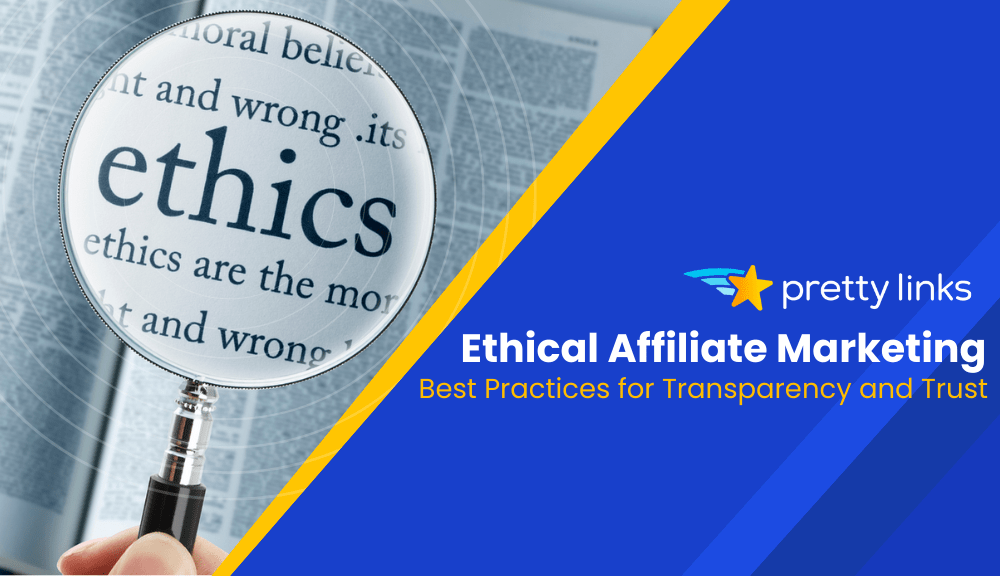How to Build Trust with Ethical Affiliate Marketing Techniques

Contents
What’s the key to thriving in the competitive world of affiliate marketing?
Credibility.
The best way to build credibility is through ethical affiliate marketing practices. When your audience trusts your recommendations, success naturally follows. This trust is built over time and through consistent, honest interactions.
Ethical affiliate marketing involves more than just meeting minimum standards. It’s about being transparent with your audience, maintaining authenticity in every interaction, and genuinely caring about the products or services you promote.
Your audience can tell when you’re being sincere, and this sincerity is what builds long-lasting relationships.
In this blog, we’ll explore the ethics of affiliate marketing in depth. You’ll discover best practices for transparency, learn how to maintain authenticity, and find out how you can earn credibility from day one.
Keep reading to build a foundation of trust and set yourself up for long-term success!
The Importance of Ethical Practices in Affiliate Marketing
Whether you’re a beginner or you’ve been doing affiliate marketing for a long time, ethical practices can uplift your affiliate business from any stage.
Wondering what this new level might look like? Well, picture this:
- You’re not worrying about new leads anymore, because you’re experiencing the power of “word-of-mouth marketing” in action for the first time.
- Your brand’s visibility is skyrocketing since users are constantly sharing your posts and spending more time on your web pages. (Google really likes that).
- You‘ve started seeing an unimaginable ROI (3600%, according to Litmus) with email marketing because people believe in your brand.
- Collaborating with industry leaders and getting featured on their posts is easier now, as they consider your brand the same.
- Unlike other affiliate marketers, you don’t have to worry about legal complications, which not only saves you money but also helps with brand reputation.
Stick to ethical affiliate marketing, and those awesome scenarios won't just be in your imagination – they'll be real!
On the flip side, here’s what can happen to your affiliate business if you DON’T follow ethical practices.
- Consumers will lose faith, leading to decreased conversions.
- Your brand’s image suffers, hindering customer acquisition.
- Legal complications and fees might close down your business.
- Collaboration opportunities will decrease as others will be worried about the credibility of your business.
Best Practices for Ethical Affiliate Marketing
Ethical affiliate marketing revolves around transparency, honesty, and integrity in promotional efforts. In simple words, do what you have to do, but be transparent about it.
If you prioritize the interest of the consumers over your own profit, you can go big in affiliate marketing.
To make this easier for you, we’ve done the research and put together some of the best practices for ethical affiliate marketing that you should never ignore.
Clear Disclosure for Better Credibility
Honesty is essential in any form of marketing, and in affiliate marketing, it's the ultimate key to success.
Your users are okay with you making a commission on their purchases, as long as they know about it.
That brings us to clear disclosures.
You can add a clear disclosure statement at the beginning of your blogs, social media posts, or any other form of content so your audience knows it's an affiliate post.
Don't hide disclosures in hard-to-find places either. The Federal Trade Commission (FTC) is strict about disclosure requirements, so make them clear and accessible to maintain trust and avoid penalties.
Say No to Deceptive Practices to Avoid Legal Fines
Have you ever bought something from an affiliate website, but ended up regretting it?
You probably encountered an affiliate using deceptive practices. Misleading claims, fake endorsements, and undisclosed affiliate links are common tactics that damage trust.
As an affiliate marketer, these practices might bring some short-term sales, but in the long run? You’ll experience the negative side of “word of mouth” marketing. Your website’s reputation will suffer, and you may face legal fines and penalties.
That’s why any sort of deceptive practices should be a big no. But how do you distinguish between deceptive practices and good ones?
An easy way is to consider yourself in the consumer's shoes. If any of your affiliate marketing activities would bother you as a customer, it’s time to stop them.
Focus on building a bond; your users will do the rest for you.
More Honest Reviews and Recommendations
Listicle blogs are a popular form of content on affiliate websites. They allow you to endorse products alongside other recommendations. This is where your honesty is put to the test.
It might be tempting to fill a listicle with products or services that offer affiliate programs. But remember, users come first.
Partner with affiliate programs that genuinely offer great solutions to your users' problems. This approach ensures you produce honest content.
Your recommendations should reflect your brand’s integrity. When your audience recognizes you as a trusted voice in a specific niche, companies will start approaching you with their affiliate programs.
Make Ethical Affiliate Marketing Easier with Pretty Links
Now that you understand the best practices for ethical affiliate marketing, it’s time to ensure you’re following them.
Based on our research, here are 3 common problems that affiliate marketers face while trying to practice ethical affiliate marketing:
- Dealing with long, spammy-looking affiliate links that no one wants to click on.
- Having too many unorganized affiliate links scattered throughout their content.
- Lacking proper disclosures and not knowing where or how to start implementing them.
Every problem has a solution, and in this case, all these problems can be addressed with one tool: Pretty Links.
It’s an affiliate link management plugin that can help you create customized, shortened and branded links. But that’s not all. You can also optimize, organize, track, and share those affiliate links easily too.
In addition to all this, you’ll have the luxury of doing all this from your WordPress dashboard, which will not only save you time but also increase your overall efficiency.
Let’s see this tool in action so you understand how great of a friend it can be for you.
Link Cloaking for Enhanced Credibility
Affiliate links are often random, long, and unclear, making visitors hesitant to click on them.
Meanwhile, your competitor uses pretty links that are easy to understand, branded, and short. What can you do?
Well, you can make your links pretty too with the Pretty Links link cloaking feature.
This feature transforms any link into a branded and shortened version, making it more credible and appealing to your users:
Automatic Link Disclosure to Save You from Penalties
If you started affiliate marketing without knowing about disclosures, you might now feel overwhelmed by the thought of editing every page to add them.
Or maybe, you have too many things on your plate, and adding a disclosure every time you add an affiliate link is impossible.
Regardless of the scenarios, Pretty Links has got your back.
With just a few clicks, you can set up automatic link disclosures for all your pages with affiliate links. Pretty Links will automatically add disclosures to all your previous and future posts:
With the Disclosure Notice enabled, then you can add your disclosure text, and choose where to display it.
Keyword Replacement Feature to Save Time
Now that you have your disclosure statement, let’s familiarize you with an advanced feature of Pretty Links.
Imagine if you could replace all the keywords on your pages, posts, and groups automatically with an affiliate link that has a disclosure note attached to it. This would save you time and give the readers a sense of your integrity.
Let's go back to that Mac Book pretty link we just created. In the Pro tab, we’ll jot down some of the keywords we want to replace with our MacBook’s affiliate links:
Now, go back to the main menu of Pretty Links and click on Options. Find the Replacement menu and Enable Keyword Replacements.
Remember to Enable Thresholds to limit the keywords per page you want to convert to affiliate links. You don’t want to end up with web pages full of affiliate links, do you?
Now, we need to add the disclosure with links. Simply enable the Keyword Disclosure option and write what you want them to see in the Disclosure Text box:
Now, you have an automatically placed affiliate link and disclosure note! Done and done.
Is Ethical Affiliate Marketing Worth the Effort?
In the competitive world of affiliate marketing, numerous strategies promise success. However, nothing can replace the benefits of maintaining ethical practices.
By adhering to ethical guidelines – such as clearly disclosing affiliate relationships, avoiding deceptive practices, and providing honest recommendations – you safeguard your reputation and build a trusting, loyal audience.
Always remember that the ultimate goal of your affiliate business should be creating value for your audience, not just making quick money. Ethical affiliate marketing isn't just worth the effort; it's essential for long-term success and sustainable growth.
How do you plan to incorporate the ethical marketing strategies discussed in this post into your own affiliate marketing efforts? Share with us in the comments!
If you liked this article, be sure to follow us on Facebook, Twitter, Pinterest, and LinkedIn! And don't forget to subscribe to our newsletter!
